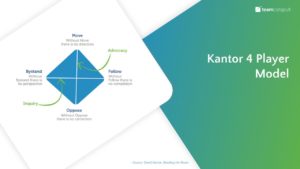How to Work with Conflict in Teams: The Agile Team Facilitation Stance
I always say: “A great leader is ready to merge from everyone!”
Today I would like to share my recent talk with Agile Toronto. We had a conversation about how to work with conflict in teams.
NOTE: If you’d rather listen to me talk than read this article first, feel free to skip to the bottom of this article and find the embedded recording, but …you’ll miss some great visuals!
Conflict… and Standing in the Storm
My definition of a “Storm” is when conflict emerges in the room, or when conflict isn’t in the room but it’s going somewhere else and it’s undermining what happens.
Together, let’s look at conversations, and the way we engage in conversation as a lens for looking at conflict, how teams communicate and how that makes a team effective, or ineffective.
I am going to start with the Kantor 4 player model.
Kantor 4 Player Model
“The structure of our conversation determines the outcome of it.” ~ David Kantor, Theory of Structural Dynamics.
Everything that we say, every sentence, every speech-act can be coded into one of four actions.
Coded into one of these four:
- MOVE – sets direction in the conversation
- FOLLOW – supports the move
- OPPOSE – offers correction or constraint
- BYSTAND – offers a morally neutral comment on what’s happening in the conversation

Here is an example of how a conversation with all of these 4 actions would go:
In a foodie group conversation:
- “Lets go get Sushi in the 5-star restaurant on the corner” That’s a MOVE!
- Your FOLLOW would be “Sounds good. Would love to.”
- An OPPOSE response is something like this: “Hey I am not so sure, I am not feeling Sushi tonight”
- While the BYSTAND action would go something like this: “It sounds like we have an idea on the table” – naming what’s happening.
MOVE and OPPOSE are the vocal actions of advocacy, bringing something forward and taking a stand for something.
FOLLOW and BYSTAND are vocal actions of inquiry and they provide curiosity and more data.
We need all four of these to be active and voiced in a conversation, when one or more are missing some common patterns emerge.
Common patterns often point to a way of looking at breakdown or conflict in our conversations, doing it in a structural way.
Common Stuck Patterns That Happen in Teams
Having the same conversation over and over again should throw up a bunch of yellow flags!
Here are 4 stuck patterns that happen in teams:
- SERIAL MOVING – Not really sure what we accomplished: nothing carried to completion
- COURTEOUS COMPLIANCE – Over time, this points to covert opposition.
- COVERT OPPOSITION – the thing that is said is different that I really intend or for somebody to bystand what I oppose.
- POINT-COUNTER-POINT – move on the table and a very clear oppose. Feels like people are locked in conflict.
When MOVE and OPPOSE are the predominant acts, we are missing a FOLLOW and a BYSTAND. Structure becomes a way to look at to bring attention to or call for one of the missing actions.
Going from Locked Opposition, MOVE and OPPOSE, to being able to bridge and find context, something that I can follow or support, something that you’re seeing, being able to name it and bring it into the conversation, keeps us in the conversation and allows us to move forward!
Groundhog Day Conversations!
Groundhog day conversations are those conversations we are having, over and over without resolution.
What patterns might this type of conversation be falling into? How can you change the nature of the conversation by bringing in a different vocal act?
You would need to manage opposition out of the room. The voice of opposition is needed! When it’s not voiced it’s an indicator that it’s coming out in one of the different actions i.e. move, follow or bystand.
Step back and look at the structure of the conversation and yourself:
Can I name what’s happening?
Can I name structurally what’s happening?
Can I let the name of the structural pattern inform how I might make an action as leader, as a facilitator in that conversation?
To listen to this conversation, and the Q & A session, watch this QuickTalk YouTube Video!


